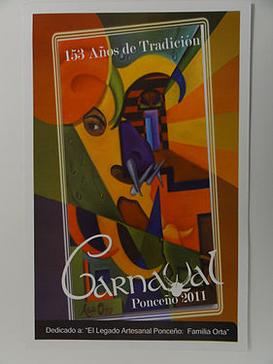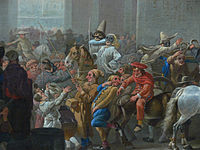
A parade is a procession of people, usually organized along a street, often in costume, and often accompanied by marching bands, floats, or sometimes large balloons. Parades are held for a wide range of reasons, but are usually celebrations of some kind.

Carnival or Shrovetide is a festive season that occurs at the close of the Christian pre-Lenten period, consisting of Quinquagesima or Shrove Sunday, Shrove Monday, and Shrove Tuesday or Mardi Gras.

The Toronto Caribbean Carnival, formerly and affectionately known as Caribana, is a festival of Caribbean culture and traditions held each summer in the city of Toronto, Ontario, Canada. It is a pan-Caribbean Carnival event and has been billed as North America's largest Festival, frequented by over 1.3 million tourists each year for the festival's Grand Parade and an overall attendance of 2.3 million.

The music of Saint Kitts and Nevis is known for a number of musical celebrations including Carnival. The last week in June features the St Kitts Music Festival, while the week-long Culturama on Nevis lasts from the end of July into early August.

The Trinidad and Tobago Carnival is an annual event held on the Monday and Tuesday before Ash Wednesday in Trinidad and Tobago. This event is well known for participants' colorful costumes and exuberant celebrations. There are numerous cultural events such as "band launch fetes" running in the lead up to the street parade on Carnival Monday and Tuesday. It is said that if the islanders are not celebrating it, then they are preparing for it, while reminiscing about the past year's festival. Traditionally, the festival is associated with calypso music, with its origins formulated in the midst of hardship for enslaved West and Central Africans; however, recently Soca music has replaced calypso as the most celebrated type of music. Costumes, stick-fighting and limbo competitions are also important components of the festival.

Emancipation Day is observed in many former European colonies in the Caribbean and areas of the United States on various dates to commemorate the emancipation of slaves of African descent.
The culture of Trinidad and Tobago reflects the influence of Indian-South Asian, African, Indigenous, European, Chinese, North American, Latino, and Arab cultures. The histories of Trinidad and Tobago are different. There are differences in the cultural influences which have shaped each island. Trinidad and Tobago is an English-speaking country with strong links to the United Kingdom.

The carnival in Colombia was introduced by the Spaniards. The Colombian carnival has incorporated elements from European culture, and has managed to syncretise, or re-interpret, traditions that belonged to the African and Amerindian cultures of Colombia. There is documentary evidence that the carnival existed in Colombia in the 17th century and had already caused concern to the colonial authorities, who censored the celebrations, especially in the main centers of power such as Cartagena, Bogotá and Popayán. The carnival, therefore, continued its evolution and re-interpretation in the small and at that time unimportant towns where celebrations did not offend the ruling elites. The result was the uninterrupted celebration of carnival festivals in Barranquilla, and other villages along the lower Magdalena River in northern Colombia, and in Pasto, Nariño in the south of the country. In modern times, there have been attempts to introduce the carnival in the capital, Bogotá, in the early 20th century, but it has always failed to gain the approval of authorities. The Bogotá Carnival has had to wait until the 21st century to be resurrected, this time, by the authorities of the city. Colombia is recognized by its large variety of festivals, carnivals and fairs. Most towns have their own, ranging from those celebrating coffee to the ones held in honor of the town's Saint feast. The common characteristics of the festivals are the nomination of a beauty Queen and the setting up of public dance floor.

The Antiguan Carnival is a celebration of the emancipation of slavery in the country held annually from the end of July to the first Tuesday in August. The most important day is that of the j'ouvert, in which brass and steel bands perform for much of the island's population. Barbuda's Carnival, held in June, is known as Caribana. The Antiguan and Barbudan Carnivals replaced the Old Time Christmas Festival in 1957, with hopes of inspiring tourism in Antigua and Barbuda. Some elements of the Christmas Festival remain in the modern Carnival celebrations.

Bahian Carnival is the annual carnival festival celebrated in the Brazilian state of Bahia, mainly in its capital, Salvador. The event officially lasts for six days, beginning on the Thursday before Ash Wednesday and concluding on Ash Wednesday at noon. The term may also be used to comprise related events that happen immediately before or after, extending the duration for up to twelve days.
Chanté mas and Lapo kabrit is a form of Carnival music of Dominica. It is performed by masquerading partygoers in a two-day parade, with a lead vocalist (chantwèl), who is followed by the responsorial chorus (lavwa), with drummers and dancers dancing backwards in front of the drummer on a tambou lélé. The Carnival has African and French roots and is otherwise known as Mas Dominik, the most original Carnival in the Caribbean.
Caribbean Carnival/Friends Of Culture was registered as a 501(c)3 non-profit organization in Louisiana, June 21, 2001. Its founder, president, and CFO is Marilyn C. LaForce, a native of St. Lucia. One of the main goals of the organization is to provide a cultural link between the Greater New Orleans area and the island nations of the Caribbean. Under Ms. Laforces's leadership (FOC) is the producer and promoter of Bayou Bacchanal, the original Caribbean Carnival in New Orleans and the premier Caribbean organization within the state. January 2020, FOC registered as a DBA, producing our second festival, "Curry With A Flavor".

The Carnival of Santa Cruz de Tenerife is held each February–March –depending on the year– in Santa Cruz de Tenerife, the capital of the largest island of the Canary Islands, Spain and attracts people from all over the world.

The Carnaval de Ponce, officially Carnaval Ponceño, is an annual celebration of the Carnival holiday held in Ponce, Puerto Rico. The celebration lasts one week, and like most observations of the holiday ends on Fat Tuesday. Thus, like the Carnival holiday in general, it is usually held in February and or March. It dates back to 1858. Some authorities, such as the Smithsonian Institution, believe the Ponce Carnaval can be traced to as far back as 250 years ago. The Carnaval coincides with the Mardi Gras of New Orleans, the Carnival of Venice, and Rio de Janeiro's Carnival and hundreds of other places that observe this holiday around the world. The estimated attendance is 100,000. Scenes of the 2011 Carnaval Ponceño were featured in the Travel Channel on 7 August 2011.
Now known as the Toronto Caribbean Carnival, Caribana began as a one-time celebration of the Canadian Centennial in Ontario's provincial capital city. The festival continues to bring a full display of Caribbean culture and traditions, attracting more than a million viewers each year. Caribana has continued to draw people from across the world to Toronto, with travellers coming from places such as the Caribbean, Europe and the United States.
Haitian Carnival is a celebration held over several weeks each year leading up to Mardi Gras. Haitian Defile Kanaval is the Haitian Creole name of the main annual Mardi Gras carnival held in Port-au-Prince, Haiti.
Carifiesta is an annual Caribbean Carnival held in Montreal, Quebec, Canada. It was established in 1974, and is held in July. The parade was cancelled in the 1990s due to conflict and firearm-related crime. As the situation progressed most of the participants moved to Toronto Caribana. In 2010 the parade was called off due to a legal battle between promoters Henry Antoine and Everist Blaise, the city of Montreal. This resulted in many groups pulling out and a struggle to maintain a street parade. The organization put in place in 2019 a new president: Jason Forbes, who resigned in 2021 because of profit and organization issues. In 2023 The parade was cancelled. The city of Montreal denied funding the parade. The event is coordinated by the Caribbean Cultural Festivities Association, a nonprofit organization. Carifiesta was established prior to some Carnivals that take place in the Caribbean, for example, Cayman Carnival Batabano. Carifiesta has also been named the largest North-American running Caribbean Street Parade.
Leslie Stephen "Teacher" Palmer,, is a Trinidadian community activist, writer and teacher, who migrated in the 1960s to the UK, where he became involved in music and the arts in West London. He is credited with developing a successful template for the Notting Hill Carnival, of which he was director from 1973 to 1975, during which time he "completely revolutionised the event and transformed its structure and content almost beyond recognition." He is also known by the name of "The Wounded Soldier" as a kaisonian.
Asami Nagakiya (1985–2016) was a Japanese musician, a steel pan player, who traveled regularly to Trinidad and Tobago to perform for the annual Carnival celebrations. She was found dead, in a case determined by the coroner to be murder by strangulation, on 9 February 2016, in a park that hosted Carnival activities, in the capital, Port-of-Spain.
The Charleston Carifest is a four-day festival held every year in June in South Carolina, organized by Lorna Shelton-Beck. Inaugurated in 2006, it is a celebration that takes place during the Caribbean American Heritage Month, marking a co-joining of European and African customs which has been developing over the last 350 years.



















